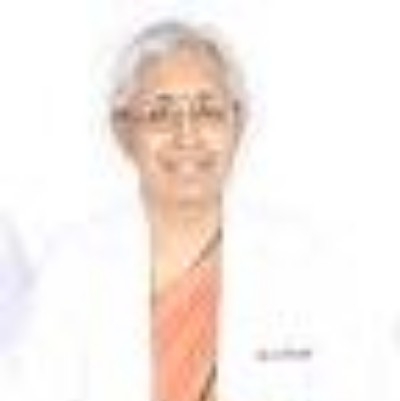
DR SUBHASHINI PRABHAKAR
Neurologist
- Fees: INR 900
-
Monday 1:00 PM - 11:45 PM
(See all timing)Monday 1:00 PM - 11:45 PM,
Tuesday 1:00 PM - 11:45 PM,
Wednesday 1:00 PM - 11:45 PM,
Thursday 1:00 PM - 11:45 PM,
Friday 1:00 PM - 11:45 PM,
Saturday 1:00 PM - 11:45 PM,
Sunday 1:00 PM - 11:45 PM
Introduction
Dr. Subhashini Prabhakar is one of the best Neurologist in Hyderabad, Telangana. Dr. Subhashini is an expert in Neurology which an experience of 46 years and has worked as: House – Officer – Paediatrics (1969 – 1970) Lady Hardinge Hospital Internship : Mt Sinai Hospital Chicago (1971 – 72) Residency – Int. Medicine, L.S. Hospital, Boston (1972 – 73) Residency – Neurology, Cleveland Clinic Ohio. (1973-1976) Fellowship : Neuro Pathology, Case Western Reserve University (1976 – 1978) Dept. Of Neurology, C.M.C. Hospital Lecturer – Professor 1979 – 1999 Head Of Neurology, Royal Hospital, Muscat, Oman (1997 – 2002) Working in Apollo Hospitals since last Assignment.
Hospital Associations
Apollo Health City Jubilee Hills ,Hyderabad
Services/Interest
- Neurology
Experience
Dr. Subhashini Prabhakar has a vast experience of 46 years in the field of Neurology
Professional Memberships
INDIAN ACADEMY OF NEUROLOGY NEUROLOGICAL SOCIETY OF INDIA AMERICAN ACADEMY OF NEUROLOGY NATIONAL ACADEMY OF MEDICAL SCIENCES INDIA
Awards and Recognitions
Dr. Subhashini was Examiner DM Neurology, Mgr Medical University, Lucknow University, AIIMS (New Delhi). Dr. Subhashini was Org. Sec. IIIRD International Symposium Of SSPE SAT. Symposium Of World, Cong. Of Neurology 1989. Dr. Subhashini Org. Symposium DN Tropical Demyelinations Dec. 1995Invited Speaker, MNI Canada – 1993.
Education
MBBS; MD (Internal Medicine); MNAMS (Neurology)
I Speak
English, Hindi.
Feedback For Dr Subhashini Prabhakar
Write FeedbackApollo Health City Jubilee Hills Hyderabad Timing
Monday - Friday
1:00 PM - 11:45 PM
Saturday
1:00 PM - 11:45 PM
Sunday
1:00 PM - 11:45 PM
What is a neurologist?
Neurology is the branch of medicine that focuses on study and treatment of disorders of the nervous system. A neurologist is a physician who specializes in treating diseases of the nervous system which is made of two parts: the central and peripheral nervous system. It includes the brain and spinal cord.
Before neurologists can practice, they must:
- Graduate from medical school
- Complete an internship
- Receive 3 years of training in a Neurology residency program.
What are the diseases treated by the neurologists?
- Stroke and Neurological trauma
- Tumors of the nervous system
- Infections of the nervous system
- Multiple sclerosis and other autoimmune diseases
- Epilepsy and Headaches
- Peripheral nerve disease
- Neuromuscular diseases
- Dementia
- Movement and Sleep disorders
When should you go and see a neurologist?
A person should go and see a neurologist if he is suffering from:
- Severe headaches and chronic pain.
- Dizziness, numbness or tingling.
- Chronic weakness.
- Problems with movement and vision problems.
- Seizures
- Difficulty in thinking and sleep problems.
What tests are done by a neurologist?
Tests performed by neurologists are Neurological Diagnostic Tests, Brainstem Auditory Evoked Response (BAER) Test, Carotid Duplex (Carotid Ultrasound), Cerebral Angiography (Also Called Vertebral Angiogram or Carotid Angiogram), Computed Tomography (CT or CAT scan), Discography, Doppler Ultrasound, Electroencephalogram (EEG), Electromyography (EMG), Intrathecal Contrast Enhanced CAT Scan, Lumbar Puncture (Spinal Tap), Magnetic Resonance Imaging (MRI), Magnetic Resonance Angiogram (MRA)/Magnetic Resonance Venogram (MRV), Myelogram, Nerve Conduction Study, Oculoplethysmography (OPG), Positron Emission Tomography (PET) Scan, Selective Nerve Root Block, Single Photon Emission Computed Tomography (SPECT) Scan, and Somatosensory Evoked Response (SSER) Test.
What is the difference between neurologist and psychiatrist?
Neurological practice relies on the field of neuroscience, the scientific study of the nervous system while psychiatry is the medical specialty devoted to the diagnosis, prevention, study, and treatment of mental disorders. A neurologist is a physician specializing in the treatment of exogenous (organic) disorders that are caused by organic brain damage, and psychiatrist is a physician that treats endogenous disorders that are not attributable to any external or environmental factor. They are due to biological, physiological, genetic mental reactions, states, and development, which is caused by the internal constitutional disorder.
How to prepare for your first appointment with a neurologist?
Write down the symptoms and other health information, including medications, previous illnesses, allergies, and your family's history of the disease. Make a list of your questions. Have the previous test results sent in advance, or take them with you. Don't be hesitant to ask questions if you're confused about something. Make sure you understand the diagnosis and treatment and any further steps that have been suggested you need to take.
